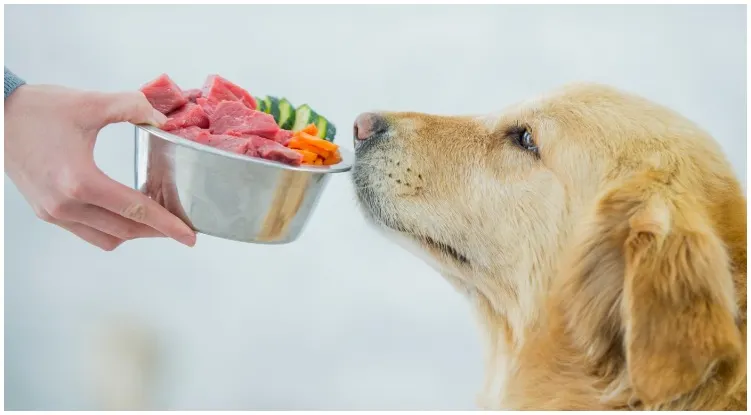Being a dog owner can be overwhelming from time to time. Even though we are trying our best, mistakes are still unavoidable. Some mistakes are bigger than others, and when it comes to food we need to be as careful as possible. Some foods that are completely harmless to us can be poisonous to our furry friends. Read on to find out which food is good or bad for dogs.
Only by educating ourselves we can protect the health of our canines. We have to make the best and safest decisions for them on a daily basis. That way we’ll make sure that they stay by our side for as long as possible.
Which food is good or bad for dogs?
To answer this question we would have to go through every different food category one by one. As it would be basically impossible to put all of that into just one article, we prepared one for fruits and one for vegetables.
On the other hand, in this article will go through the most common animal source foods, nuts and grains we give to our canines. So keep on reading to find out which food is good or bad for your dog.
- Can dogs drink milk?
- Can dogs eat turkey?
- Can dogs eat shrimps?
- Can dogs eat chocolate?
- Can dogs eat ham?
- Can dogs eat honey?
- Can dogs eat nuts?
- Can dogs have eggs?
- Can dogs eat rice?
- Can dogs eat yogurt?
- Can dogs have peanuts?
- Can dogs eat cat food?
- Can dogs eat fish?
- Can dogs eat tuna?
- Can dogs eat salmon?
- Can dogs eat ice cream?
- Can dogs eat oatmeal?
- Can dogs eat pork?
- Can dogs eat bacon?
- Can dogs have cheese?
- Can dogs have popcorn?
- Can dogs eat raw chicken?
- Can dogs eat chicken bones?
Can dogs drink milk?
We already know that many dog food companies absolutely love dairy products and put it in all sorts of food – But can dogs have milk? Is it completely safe? The short answer would be – maybe. In small quantities, and as a treat -yes! Your dog can have small amounts of cow or goat milk from time to time. Although, this rule applies only to dogs that aren’t lactose intolerant. Even if your dog is completely healthy, drinking bigger quantities of milk can cause intestinal upset, and symptoms such as diarrhea, vomiting and loose stools.
Milk is high in fat and natural sugars, which is another reason to give it to your dog only in small amounts. In addition to this, many dogs are lactose intolerant as well. If you never gave dairy products to your dog before, make sure to start with very small quantities.

Can dogs eat turkey?
It completely depends on the way we prepared the turkey. If we’re talking about plain turkey meat – the answer is yes! Unseasoned, this meat is completely safe and good for your dog. Turkey is rich in protein, riboflavin, phosphorus.
However, you shouldn’t give Thanksgiving turkey to your dog. Thanksgiving turkey is rarely cooked without seasoning such as salt, pepper, herbs and different spices. They are also full of stuffing, butter, oils, garlic and onions. For dogs, these spices can lead to intestinal upset, or in worst case scenario – poisoning.
If you decide to give turkey to your dog, always make sure it’s plain, without skin and bones.
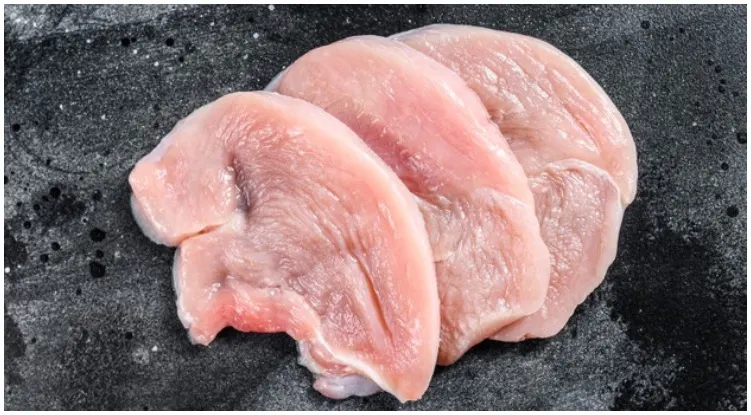
Can dogs eat shrimps?
If you ever asked yourself: Can dogs have shrimp? Know that the answer is a clear yes! But just like with any other food, moderation is key. Even though shrimps are low in calories and rich in nutrients, it should still be just an occasional treat.
Shrimps contain some of the most important nutrients that dogs need: Vitamin B12, niacin, phosphorus, and anti-oxidants. They are low in fat, carbohydrates and calories. The biggest downside is that they are rich in cholesterol. That’s the main reason why we should give shrimps to our pups only as treats and in small quantities. Also – don’t give your dog seasoned shrimps!
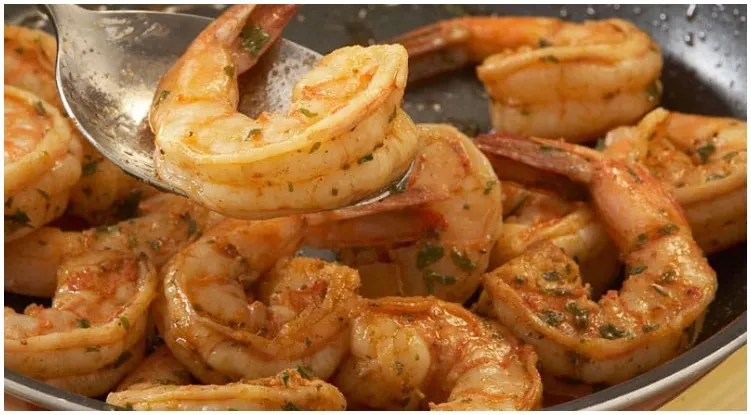
Can dogs eat chocolate?
It’s a widely known fact that chocolate is toxic to dogs. Having that in mind, if your dog ever eats chocolate make sure to monitor him as it could cause a serious medical emergency.
But why is chocolate bad for dogs?
Chocolate contains theobromine and caffeine. They can speed up your dog’s heart rate and overstimulate their nervous system. The risk of your dog becoming sick from eating chocolate depends on the amount of chocolate they ate, their weight, and the type of chocolate they ingested. Pure cocoa powder is the most toxic, while milk chocolate is the least toxic. If your dog ate dark or unseeable baker chocolate, please contact your vet as soon as possible. The more cocoa powder the chocolate contains, the higher the risk of poisoning is.

Can dogs eat ham?
Every dog owner is tempted to give it’s dog a piece of ham while making a sandwich. But is that really safe? I mean it is protein, and protein is good for dogs. Right?
Well, even though ham may be rich in protein, it’s also rich in fat and sodium. Sodium isn’t healthy for either us or our dogs. We should avoid fat as much as possible in our dog’s diets, as it can lead to pancreatitis.
Even though it wouldn’t hurt to give your dog one piece of ham every once in a while, you shouldn’t do it to often. The best option would be to keep the ham for your own sandwiches and snacks.
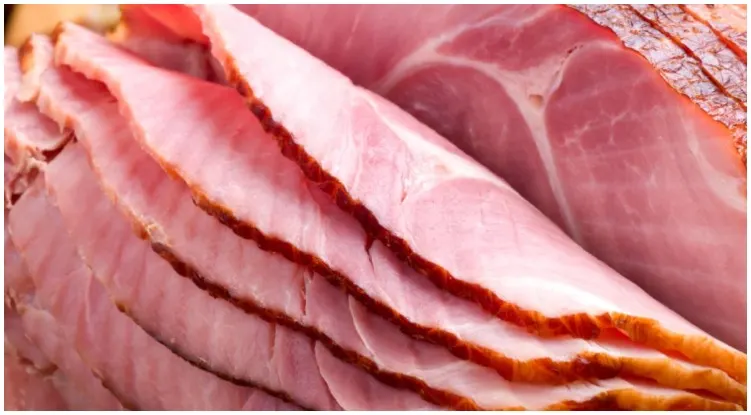
Can dogs eat honey?
We associate honey with many health benefits, at least when it comes to humans. Even though some food is healthy for us, we always have to wonder: Which food is good or bad for dogs? So can dogs have honey too? The answer is yes!
It’s completely safe to give your dog natural honey, but again only in small quantities. Honey is rich in natural sugars and therefore can lead to obesity just like any other type of sugar. Also raw honey should never be given to dogs and puppies with compromised immune systems as it may contain botulism spores. If your dog is obese or diabetic, you might want to skip the honey too.

Can dogs eat nuts?
Even though not all nuts are toxic for dogs, they are all rich in fat. High levels of fat in food can lead to obesity and pancreatitis. Also stay away from seasoned and salted nuts. Sodium and other spices can lead to water retention and other complications.
Some nuts are even toxic to dogs, such as macadamia nuts. Peanuts and cashews are considered safe, but don’t give them to your dog often. There are plenty of other treats out there that are a better choice for dogs.
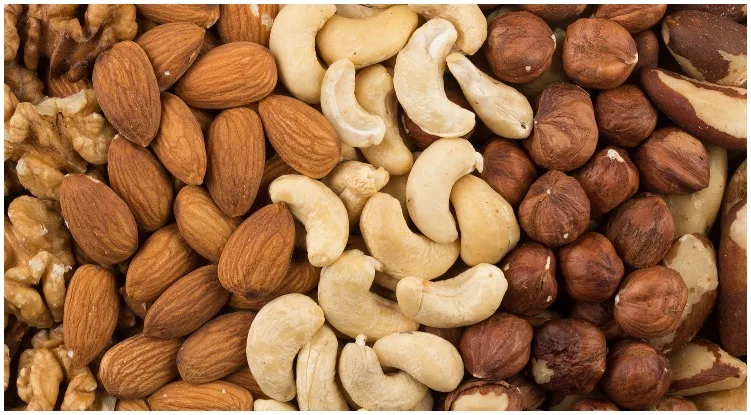
Can dogs have eggs?
Cooked eggs are perfectly safe for dogs. And not only that, they are also rich in nutrients. Good quality eggs that are from a free-range farm are high in protein, fatty acids, vitamins and amino acids.
But can dogs eat raw eggs?
Even though cooked eggs are safe for dogs, raw eggs raise a few concerns. The main risk of feeding your dog raw eggs is them contracting salmonella. Besides salmonella, they could also get infected with various bacteria that may grow in eggs but usually die when the egg is cooked.
Feeding your furry companion raw eggs can also lead to biotin deficiency. Biotin supports healthy skin, hair, cells and metabolism in dogs.
The best decision would be to always cook the eggs before giving them to your dog.
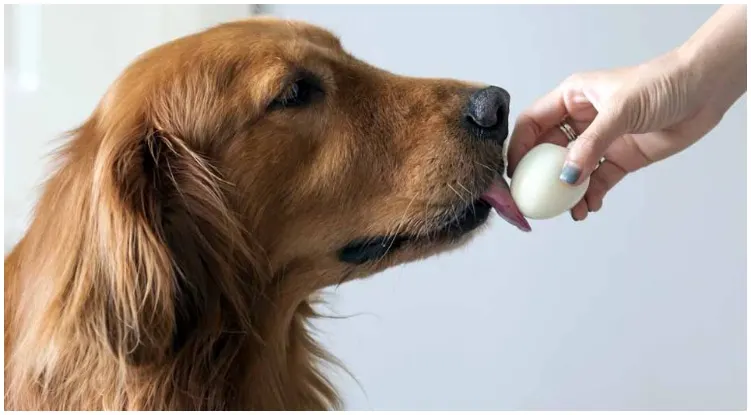
Can dogs eat rice?
We eat rice all over the world by many people. While exploring in this article which food is good or bad for dogs, we’ve already noticed that not all food that is healthy for humans is also healthy for dogs. But when it comes to rice – it is perfectly safe to give it to your dog.
Not only that, but we ofte find rice as an ingredient in commercial dog foods. We also give white rice to pups with an upset stomach. It’s easily digestible, quick to make and low in fiber.

Can dogs eat yogurt?
Yogurt isn’t toxic to dogs, but it does contain lactose. And like we already stated when we were talking about milk – many dogs are lactose intolerant.
The benefits of yogurt are that it’s rich in calcium and proteins. Yogurt can also act as an probiotic, but make sure it doesn’t contain any added sweeteners or sugars.
If you want to feed your dog yogurt, the best option would be a Greek-style yogurt. It has lower levels of lactose than other yogurts.
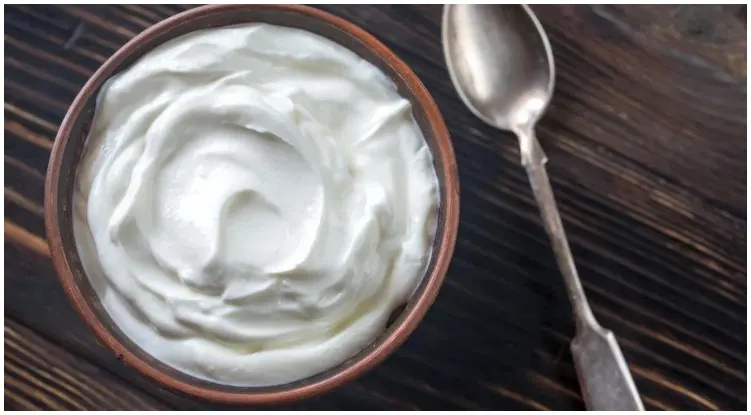
Can dogs have peanuts?
Dogs are absolutely crazy about peanut butter and they just can’t get enough of it. We often given as an occasional treat. But are peanuts really safe? And is peanut butter good for dogs?
When it comes to dogs, not all peanuts or peanut butters are good. Some can even be toxic. The only peanuts you should be giving to your dog are raw or unsalted ones. Salted peanuts contain lots of sodium and can cause water retention.
Raw and unsalted peanuts on the other hand are perfectly safe and even healthy for dogs. They are rich in protein, vitamin E, niacin, vitamin B6 and fatty acids. Peanuts and peanut butter can therefore be a protein-rich snack for your dog, but there are still some things to consider.
The best option when it comes to peanut butter would be to made it at home, from unsalted peanuts. Homemade peanut butter allows you to control the amount of sodium that goes into the recipe. Another big risk of giving your dog peanut butter from the supermarket is xylitol poisoning. Xylitol is a artificial sweetener that is highly toxic for dogs. Read more about the effects of xylitol in dogs here.

Can dogs eat cat food?
Even though your dog loves to steal a bite or two from your cats food, there is still a reason why there is separate foods for dogs and cats. Your dog won’t be harmed if he eats small amounts of cat food every now and then, but you shouldn’t feed it to him on a regular basis.
Cat food is rich in meat-based protein, which might be the reason that dogs are so tempted to eat it. The flavor and smell is much stronger. But feeding it to your dog on a regular basis can cause complications.
Cat food does contain the correct balance of protein, fiber, and all of the nutrients dogs need to stay healthy. If given to dogs as a daily diet, it can lead to intestinal upset, pancreatitis snd obesity.
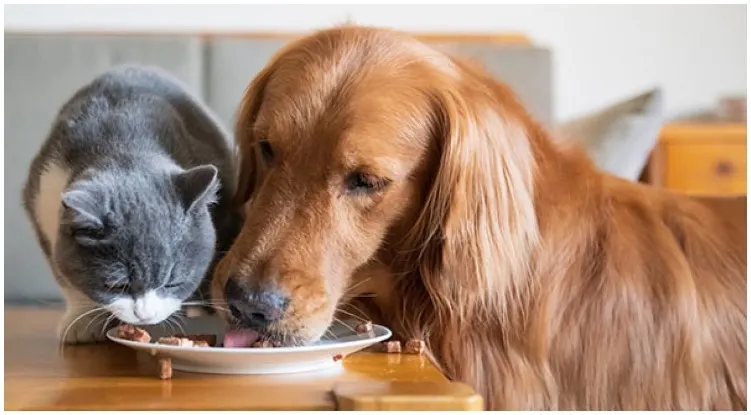
Can dogs eat fish?
Long story short – yes! Fish can be a great food choice for your dog, but if you’re considering to add fish into your canine’s diet, here are some things to consider:
Fish is rich in protein and omega-3 fatty acids. It’s also a great alternative for all dogs that are allergic to chicken. But always make sure to start with small amounts so you’ll avoid potential intestinal problems.
If you’re going to give fish to your dog make sure to fully cook it, and don’t add any additional seasoning or oils. And we can’t stress this enough – Make sure to clean it from all bones!
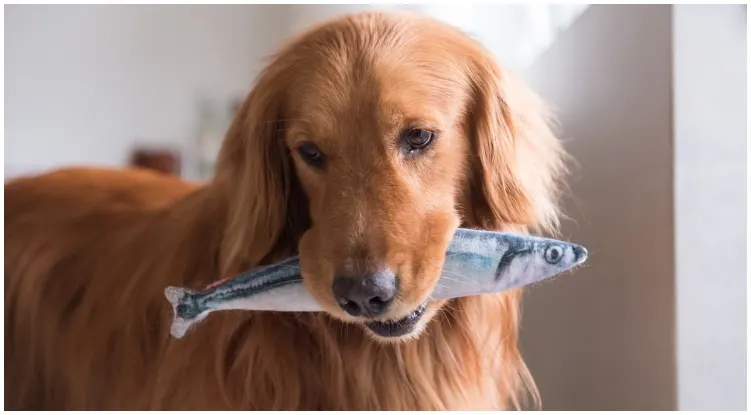
Can dogs eat tuna?
The answer is absolutely NOT! Feeding your dog tuna could lead to some serious health problems.
Tuna contains high levels of mercury, much higher than other types of fish. The larger the fish and the longer it lives, the higher the concentration of mercury is. Tuna are large and long-living fish, that’s why mercury levels are so high.
Consuming too much mercury can lead to mercury poisoning, and cause health complications such as:
- Anxiety or nervousness
- Blindness
- Kidney damage
- Loss of coordination
- Tremors
- Vomiting blood
- Watery or bloody diarrhea
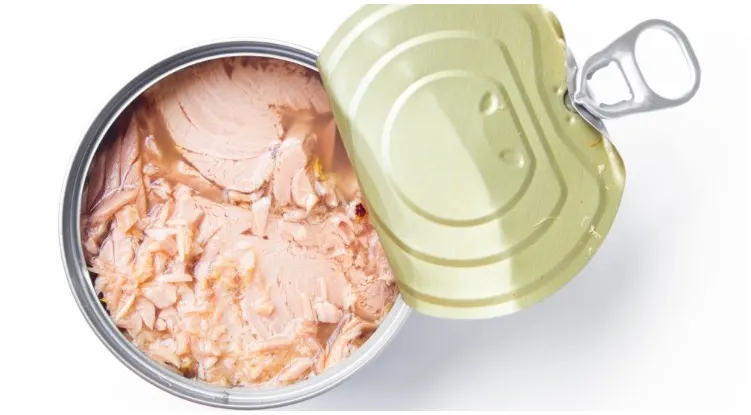
Can dogs eat salmon?
Contrary to tuna, salmon is actually a great choice. It’s rich in omega-3 fatty acids. They are known for decreasing inflammation, supporting the immune system, and keeping your dog’s hair healthy. Salmon is quite expensive, and therefore the ingredient of high-quality dog food.
If your dog is allergic to chicken, salmon will be a great alternative as it’s also rich in protein.
There are still some things to consider before feeding your dog salmon: Never give your dog uncooked salmon as it can contain parasites. Raw salmon also contains small bones that could possibly choke your dog or hurt his stomach.
Always choose boneless fillets, but you’ll still have to check for small bones before cooking it.
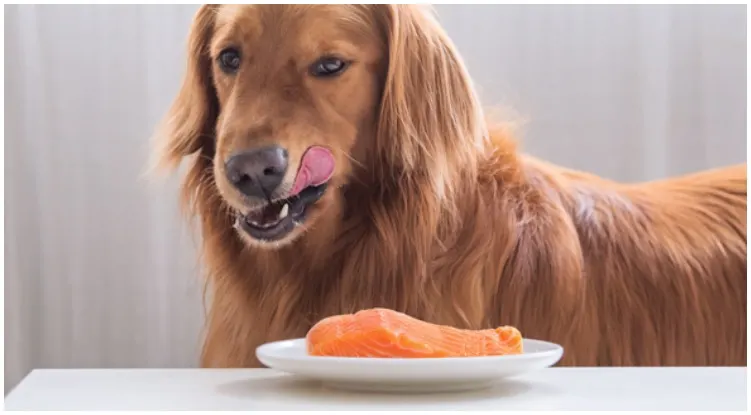
Can dogs eat ice cream?
Even though it’s highly tempting to share a cone of ice cream with our dogs in the summer months, the best possible option would be to avoid it as much as possible.
There are various reasons as to why we shouldn’t give ice cream to our dogs, one of them being that many dogs are lactose intolerant. We’ve already discussed this when we were talking about milk, but basically dog’s bodies weren’t made to digest diary.
Another possible problem with ice cream is that it’s filled with sugar, which could lead to weight gain and obesity.
And lastly, some ice cream flavors could even be toxic. Chocolate, for example. We’ve previously stated why chocolate is bad for dogs, so scroll up if you want to read it again.

Can dogs eat oatmeal?
Oatmeal is a popular breakfast option for many people, but is it equally as good for dogs? The answer is maybe. Depending on the way the oatmeal was prepared.
It can be a great option for dogs that are sensitive to wheat or grains. Oatmeal contains a lot of vitamin B, omega-6 fatty acids, and fiber. But don’t overdo it it, as a diet rich in fibers can also cause intestinal upset and diarrhea.
The best way to prepare oatmeal for your dog is to cook it with water, not milk. Also, don’t add any salt, sugar, butter, grapes, chocolate or raisins. Never feed your dog flavored oatmeal as well. Once the plain oatmeal is cooked, serve it at room temperature.
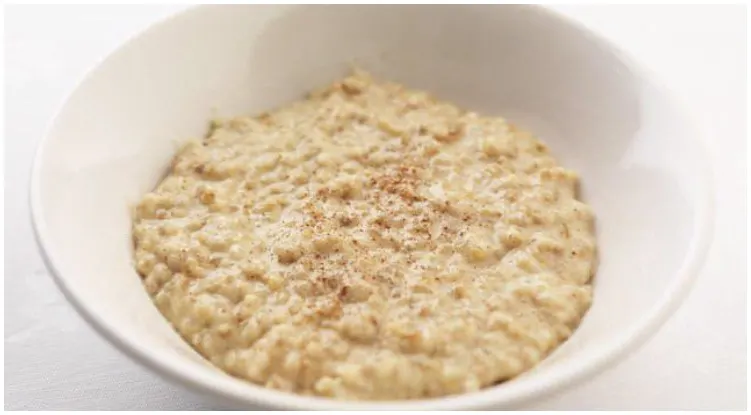
Can dogs eat pork?
It’s a bit more complicated than simply yes or no. Even though it is safe for dogs to eat pork, there are still certain conditions that should be followed.
Plain, unseasoned pork is safe to be eaten by dogs. Never add onions or garlic to your dog’s food as it could lead to poisoning.
Raw pork is also highly dangerous for dogs and humans as it can possibly contain the parasite trichinella spiralis larvae, that causes trichinosis.
As long as you give your dog plain cooked pork with no sauces, spices or too much sodium, your dog will be fine. Pork isn’t the best option when it comes to meat though, as it it rich in fat. That could lead to possible weight gain and therefore obesity.
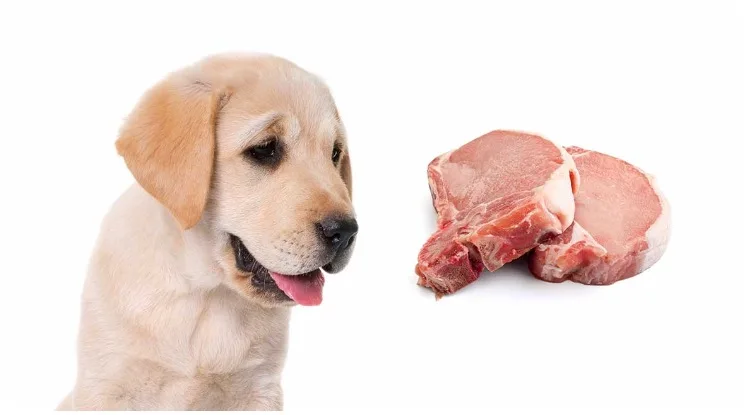
Can dogs eat bacon?
The answer to this is a clear no! Processed meat such as bacon, ham and sausages are not only highly dangerous for dogs, but humans as well!
They contain different carcinogenic substances that can cause the growth of tumors in both humans and animals. Besides this, bacon is also filled with fat and sodium, both of which can cause serious medical conditions in dogs. For example: Water retention, pancreatitis, obesity and heart failure.
Make sure to NEVER give bacon to your dog, especially not in larger quantities.

Can dogs have cheese?
Mostly yes. But only in moderation and if your dog is not lactose intolerant. You should give it as an occasional treat, and not a whole meal. Cheese is rich in protein, calcium, vitamin A, fatty acids, and B-complex vitamins.
While cheese makes a great snack, there are still some things to consider. It’s a high calorie food, and therefore could lead to weight gain. It’s also rich in fat, which can cause pancreatitis if given to dogs in large quantities. Some sorts of cheese also contain different herbs, garlic and onions that could be toxic for dogs.
The best choice would be a low-fat cheese like mozzarella, cottage cheese, or a soft goat cheese.
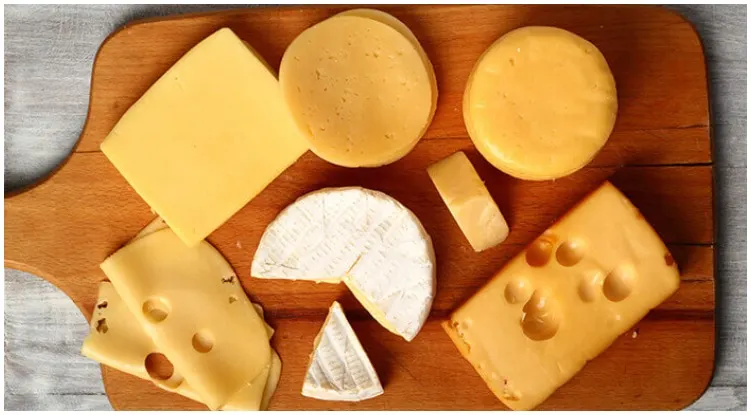
Can dogs have popcorn?
We know how it goes: You’re having friends over for a move night, popcorn drops on the floor and your dog makes sure to quickly eat it. Dog owners are always wondering which food is good or bad for dogs. So in these moments you have to ask yourself: Is popcorn bad for dogs?
Popcorn itself isn’t bad for dogs. It’s actually rich in magnesium, manganese, phosphorous, and zinc, along with fiber and trace amounts of vitamins. The main problem when it comes to popcorn is the butter and salt. High levels of sodium and fat can cause serious medical conditions in dogs.
Kernels can also be quite problematic, as they sometimes get stuck in dog’s teeth.
Even though your dog won’t be harmed from eating some popcorn here and there when you’re having a movie night at home, the best option would be to keep it in moderation and only use it as an occasional treat.

Can dogs eat raw chicken?
Raw diets became quite popular lately among dog owners. But is it really safe to feed raw chicken to your dog? The answer is mostly yes.
Dogs have stronger stomachs than we do and therefore can deal with the bacteria that is found in raw chicken. It’s still important to always make sure to get your chicken from a responsible source if you’re going to feed it to your dog raw.
Chicken is a great source of protein, but doesn’t contain a lot of fat or carbs. That’s why it’s a great choice for dogs who are struggling with obesity.
It’s important to note that not all dogs can eat raw chicken, or chicken in general. A lot of smaller dog breeds are allergic to poultry. Also if you never gave raw meat to your dog, make sure to ask your vet first and start with smaller amounts.
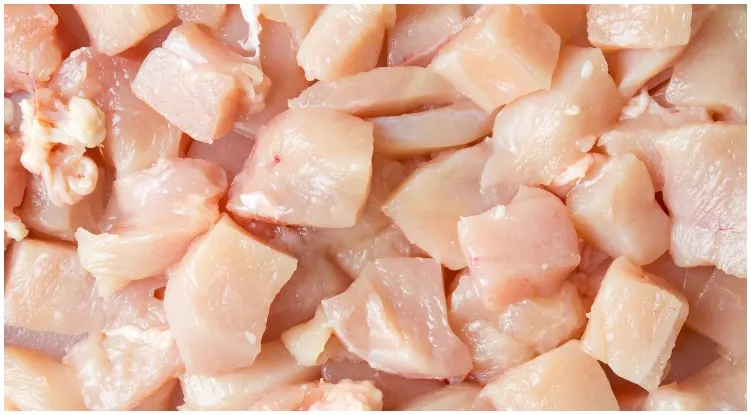
Can dogs eat chicken bones?
Absolutely not! Especially if the bones were cooked. Your dog eating cooked chicken bones could lead to a medical emergency.
Cooked chicken bones often break and splinter. The small bone parts can cause your dog to choke, get caught in their throat, but they can also puncture the gastrointestinal tract. This would cause serious health problems, it would also be terribly painful for your dog. In the worst case scenario it could even be lethal.
If you think your dog ate chicken bones, raw or cooked, monitor them and contact your vet as soon as possible.
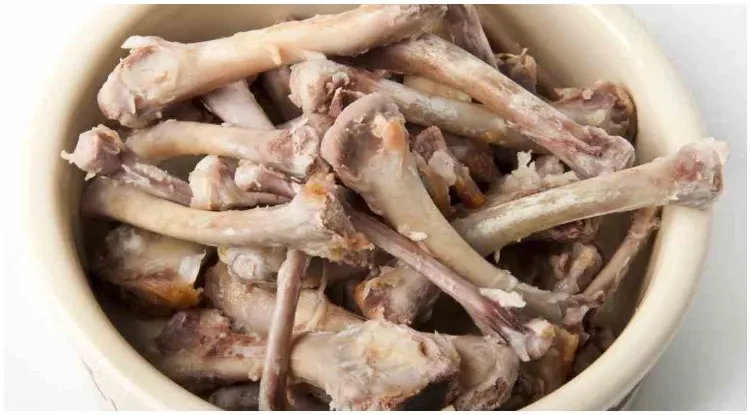
Can dogs eat cinnamon?
We know that certain human food can be highly toxic for dogs, but what about cinnamon? Is it safe to give them a bite of our cinnamon buns or cookies? Or should we avoid it at all costs?
Cinnamon is thankfully not toxic for dogs, but that does not mean that you should be giving them large amounts of it. In some cases, it can cause irritation in your dog’s digestive system or even skin. It’s harsh on their intestinal mucosa and can cause irritation if consumed in large quantities. If your dog inhales cinnamon powder, he may experience coughing, sneezing, or in worst-case scenarios: choking and difficulty breathing.

Can dogs eat bread?
Yes, they can. But only in moderation. Just like you should be eating bread too. While plain white bread is safe for dogs (unless they have some allergies), it’s still high in carbs and calories. It won’t hurt your dog if he eats a bit bread from time to time, but don’t overdo it. Giving them large amounts of bread on a daily basis will definitely lead to weight gain and obesity.
Bread is a filler food and does not contain any nutrients that are good for your dog. All it will provide your dog with is lots carbs and calories.

Can dogs eat saltine crackers?
Even though small amounts of saltine crackers won’t necessarily hurt your dog, we won’t recommend that you feed them to your dog – stolen crackers while you are not watching from your puppy would be forgiven!
That’s because they have too much sodium in them, which can cause your dog to have certain unpleasant complications and even develop conditions such as sodium poisoning, heart and kidney failure. All of those could harm their health seriously.
So, it’s better to keep your pooch away from this stuff. Store it somewhere where your dog doesn’t have access and you don’t have to worry.

Can dogs eat Parmesan cheese?
Yes, dogs can eat Parmesan cheese. However, they can only eat small amounts of it. In most cases, the amount of Parmesan that is found on your pasta or lasagna won’t hurt your dog, and he will be fine if you sneak him a small bite under the table. However, that’s where it should stay at — a small and occasional treat. Don’t feed your dog too much Parmesan cheese as it could lead to some serious health conditions due to the high levels of sodium in it. The issue include kidney failure and heart disease.
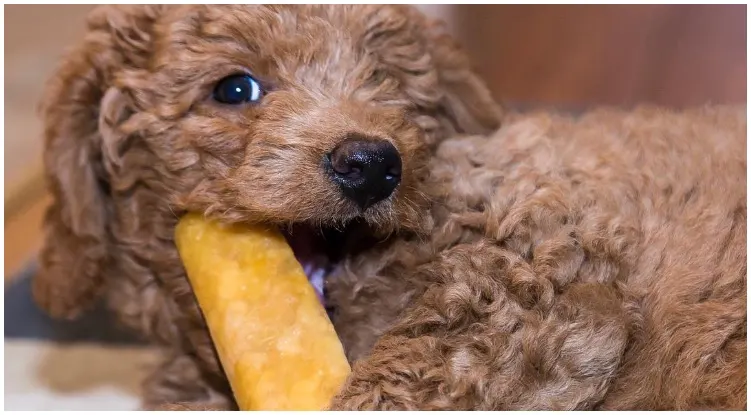
Can dogs eat imitation crab?
The short answer to that question would be — yes. However, while they theoretically can eat it, you should still avoid giving it to your canine.
First of all you have to know that the stuff found in imitation crab has literally nothing to do with real crabs. Instead, they are made from processed white fish and additional additives that give them the taste of crabs. The white fish is highly processed and the color of the imitation crab comes from food coloring and not from the fish itself.
While eating a small amount of white fish won’t hurt your dog, higher amounts could lead to some serious side effects. So no matter how delicious you think that these surimi sticks are, don’t give them to your dog.

Conclusion:
After going through different types of food, either animal sourced, plant based, raw or cooked – it’s time to draw the conclusion. Which food is good or bad for dogs?
To keep it as short as possible: Organic, unseasoned, low-sodium, low-fat, high-protein, and low-carb are the things you want to look for when buying food for your dogs.
Sweets like chocolate or ice cream should be avoided. Dairy should only be given in moderation and only if your dog isn’t lactose intolerant.
High levels of fat can cause pancreatitis in dogs, while high levels of sodium can cause water retention.
Giving your dog raw meat or eggs can cause possible Salmonella infections, while giving raw pork or salmon can lead to parasites.
Treats like peanuts, cheese, popcorn, should only be given in moderation.
Never give your dog any kind of food that contains onions, garlic or herbs, because they could be toxic for dogs.
And lastly, if you’re just starting to introduce your dog to new foods – always start with small amounts and be on the lookout for possible allergies.

